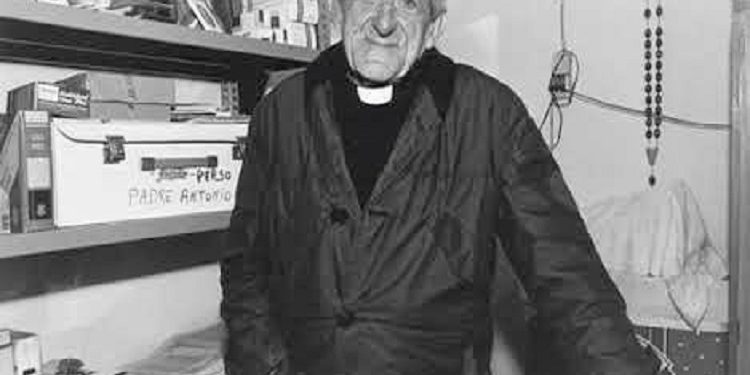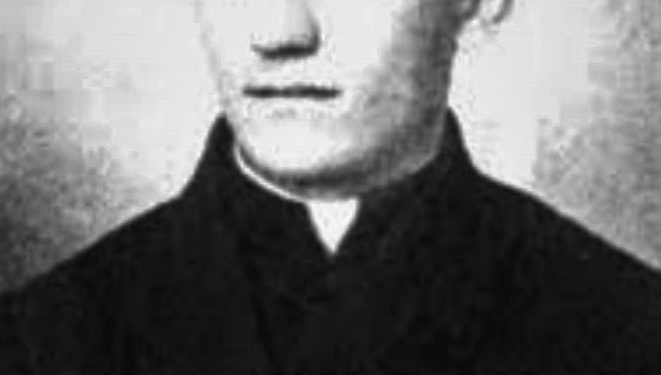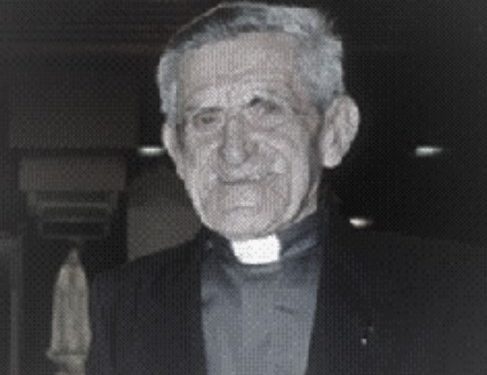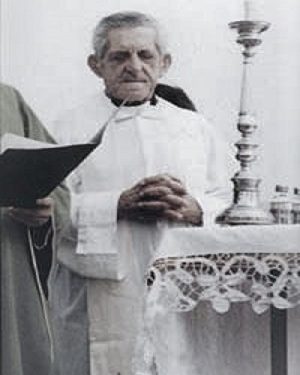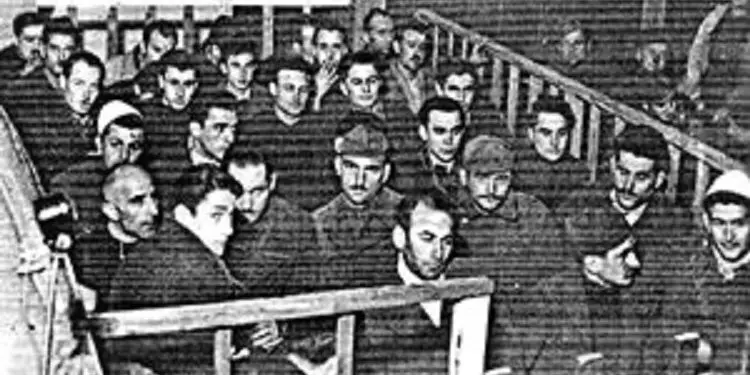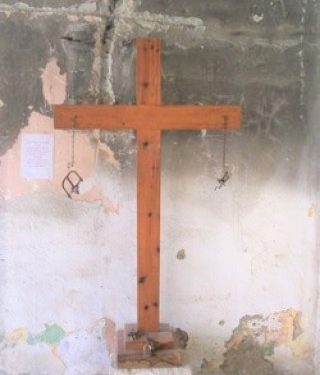Second part
Memorie.al / On March 9 we remember the anniversary of the death of Father Anton Luli, martyr and witness of Christ, Albanian Jesuit, (Lohe – Koplik, July 17, 1910 – Rome, March 9, 1998). Witness of the ordeal of the Albanians during the communist regime, on November 7, 1996, in the Vatican, on the occasion of the celebrations of the 50th anniversary of the priesthood of Pope John Paul II, the Jesuit, Father Anton Luli, made John Karol Vojtila cry, told the story of the martyrdom of the clergy and the Albanian people under the communist dictatorship, and the story of his personal suffering for Fè and Atdhè. So extraordinary was the life of the Albanian Jesuit, Father Anton Lulit that his fellow Jesuits around the world knew him as martyred, (dead) having no news of him for years, who was buried alive among the prisons and camps of concentration of the communist regime in Albania. Therefore, when they could meet him again, almost as if he had come out of the grave, they dedicated to him the book “Già dato per martire” (translated into Albanian with the title “Attë Lulin we knew the martyr”) – published in 1996 by Civiltà Cattolica. And he not only came out alive from the grave where the communists had locked him, but he also managed to celebrate the revival of the Church – seeing for himself the power of God’s Hand. It was precisely the heartbreaking testimonies of these years that Father Luli brought with him to his Jesuit brothers, when he finally came out alive from the grave and began to tell, so that todays and future generations do not forget what happened, to preserve freedom as the most important thing expensive, if they do not want to relive the tragedy of those who, even in the grave, have the marks of martyrdom on their bones.
Continues from last issue
Among slaves in forced labor… to hastened death
Some time ago I also read the book of the Italian priest Father Giacomo Gardini (in Shkodër he is known as Father Jaku) “Ten Years of Prison in Albania”. This Italian missionary describes the horror he experienced and continued to experience in forced labor camps, internment camps and prisons. Even the events that his brother in Christ, Father Anton Luli S.J. the confessions match the original stories of Father Jaku, who after the conviction and at the insistence of the Italian Government was repatriated to Italy.
All the events described by Father Luli took place in November 1948. After the trial, he was sent to Bede, in the field of Kavaja, where there were some marshes to dry. From morning until dinner, the imprisoned Albanian slaves worked to provide 750 grams of bread and soup with a few grains of rice.
The living martyr Pader Luli, the survivor of the communist hell, tells: “Once, just to tell an episode, we were going to open deep canals. It was a 7-8 meter long canal. I was on the edge of it and from weakness I rolled over and finally fell. The brigadier, who was a Shkodran Muslim, informed the guard: “He can work, but he pretends he can’t, and he doesn’t work.” The guard comes and says to me: “Why isn’t he working?”
Priests then hated and fought. The guard says to the brigadier: “Put a hu here, stick it on top of the stoma of the canal, take this here, make it lie on the stoma upside down and tie the legs to the hu.” All the blood rushed to my head, but I was so tired and worn out that I felt some relief because I could rest a little…! For seven years I have never been able to take a shower. When we walked in line, we counted the lice on the shoulders of our friends, without talking about the fleas and bugs that tortured us day and night…”!
In the scorching sun without any shade around, prisoners and Father Luli worked until the evening came. No glass of fresh water was offered. Even the little warm water they brought him to drink in the scorching heat was full of worms swimming at the bottom of the bowl.
One day Father Luli left to go to the bathroom, to do his personal needs. He approached the pit and his foot slipped and the bread he was holding fell into the pit. He took the stale bread, went to the spring and washed it. He started to trap us and without thinking much he started to eat it in bed.
“After a week, I told him, he remembers, I told the event to Father Jak Gardini, a Friulian Jesuit, who was imprisoned with me in the same camp. “Did you feel any worries? Told me. “Not at all! I answered. And Father Gardini added: “It is a strong hand that protects the prisoners”!
When the prisoners went to work, everyone had to run and whoever stood last was beaten with the prison guard’s stick. Father Luli tells a very painful and criminal story that communist executioners did to a prisoner by burying him alive.
“That’s right, but then they took him out. The guard wanted to torture the Jesuit, Father Mark Harapin, a noted Albanian writer and meritorious professor of Shkodra, who could no longer stand due to fatigue and old age. For this reason, he forced the other priests to dig a hole in the swamp and cover it with mud up to the throat.
The priests formed a special brigade of fifteen people. They always worked together and used them in the most difficult jobs. The salvo against the priests was terrible: they wanted to destroy us, to exterminate us”.
The only memory and respect that Father Luli had in Bede i Kavaja was a bird or stork of the camp. A cute episode, but also very meaningful. The stork loved them prisoners and they loved him. The bird accompanied them from breakfast to dinner wherever they were. “We welcomed him with joy and felt great satisfaction, thinking that at least the birds of the air had sympathy for us.”
While the extermination camp of Burrell, it had become a real hell for all the prisoners. After 6 years of working in the Beden camp, Father Lul was sent to the notorious Burrel prison, where political prisoners died every day due to suffering and torture. Communists for the sake of nostalgia, which they had for Nazism, open the doors to Mant’hausen or the Albanian Auschwitz.
“I was sent there, just to replace another one, who was spared such a punishment – due to personal tricks and antics. Given that Tirana wanted 17 prisoners for Burrel, I was the 17th,” confesses Father Luli .
After 7 years in prison…!
On October 20, 1954, Father Luli was released from Burrel prison. He leaves with the few ragged spoils in Shkodër to Ipeshkvi and asked him to perform religious service, because he thought he was already free.
But the Bishop could not act with complete freedom. He had to get permission for the priests, who had been released from prison, to the higher authorities of the communist government. After this formality, the answer was positive and so the superior assigned him to Shënkoll near Lezha. He stayed there for 15 years and six months (1954 – 1979). The priest had to be careful that whenever there were provocations, security people accompanied him wherever he went and performed religious services near the believers.
In the parish of Shënkolli, he stayed from 1955-1966, when the Church where he served was closed and turned into a “culture hall”. It was the first church to be closed in all of Albania and immediately turned into a cultural center. While for all other churches, the closing date was March 19, 1967, Palm Sunday. In this same year, Albania was officially declared “the first truly atheist state in the world”.
The clergy dispersed…! The hard day’s work began. All the clergy needed work to survive. Of course, they were not looking for work in the office or in the administration, but a manual laborer in agriculture, construction, opening canals. Father Anton Luli, after many years, returns to his hometown in Lohe above Koplik i Përm in Malesia e Madhe to his brother, where he stayed for 10 months and worked in agriculture.
It was always under the supervision of Sigurimi, which had distributed its own assets even in the cooperative. A small mistake was expected from the friar to put the shackles back on. Even his brother’s family felt the persecution in all its forms, which was exercised by the communist regime. His relative has always taken care of Father Anton Lulin, visiting him while he was serving his prison sentence in the concentration camps. In order not to burden his brother even more, he leaves the highlands and leaves for Shkodër, where he looks for work.
For 12 years I have been working as a manual laborer in agriculture, always with pickaxe and shovel in the mud and swamp. “I remember that once, in the early days, while I was gathering corn, I sank into the mud with all my boots and I couldn’t get out, because I didn’t know the place. I was getting lost more and more. I called my workmates and they came and they took me out. The work was hard, but I was supported by the brigadiers, who respected me as a priest. But they couldn’t do much, as they were always afraid of spies.”
Second imprisonment (1979 – 1989)
Father Anton Luli S.J., was waiting to receive his so-called pension, for 11 years of slave labor amid the sun, rain, snowstorms, frost and the stresses of persecution, in the State Agricultural Enterprise. In the middle of the rice field, a military car came and approached the worker and one of the policemen said to him “Get in the car…! In the name of the people, you are under arrest”! It was April 30, 1979, when he was sent to the Sigurimi prison in Shkodër, where they checked the thread for pe.
Father Luli reports: “I found out that the Archbishop of Shkodra, Monsignor Ernest Çoba, had been in the Security prison in Shkodra for four years. The whole city remembered that he had died. A man who was in the cell with me told me: “Monsignor Çoba is here and I will prove it.” It could be seen through a small crack in the door. But he described it to me in such a shocking way that I did not want to see it. It was transformed, diminished, yellowed, lumpy, and unrecognizable.
He spent four years in the terrible Security prison and who knows how much he suffered! Then they sent him to the hospital in Tirana, to a ward designated for prisoners, and there he died in 1980…”! Father Luli was waiting for the process. The investigators asked him the same questions, but he also gave the same negative answers to everything. After 9 months in the Sigurimi prison in Shkodër, it was the turn of the process.
He had 10 witnesses. All of them were young, who had worked for some time in the state agricultural enterprise. They all use the same text: “It has done propaganda against the government! It has done economic sabotage! It has violated the bread of the people! It has damaged the government a lot”! The prosecutor in the Court of Shkodra on November 6, 1979, requested a shooting for Father Anton Lulin S.J.. After two days, the sentence was returned to him with 25 years in prison, which was equivalent to life imprisonment.
At that time the priest was 70 years old. Forced slave labor again, in the camp of Ballsh (Fier). He stayed there for 4 years, where 15 other priests also served their sentence. The camp had 1,600 political prisoners. One silo held up to 200 people, sleeping on planks on straw mattresses. There were spies, who did this to have facilities in prison, and the one who was indicted was re-sentenced for another 10 years.
For many years he said the rosary with his fingers, since he could not even make a cross. He is transferred to the camp of Shënkolli, in the place where he had previously been a parish priest. He stayed there for 4 months, where he also got a cold (pneumonia) on both sides. A kind doctor helped him.
From north to south.
The transfer to Saranda began, in the village named by the communists as Progress, but whose real name was Saint Basil. He stayed there for 2 years. Years pass…!
The first public mass after the release, on April 15, 1989
In freedom, in order not to be seen by the security officials, Father Luli, as well as other priests; have tried to do some baptism quickly and secretly. He returned to live near his brother in Bushat. He baptized children and said mass in the room without the others knowing. This continued until freedom of belief was restored in Albania.
The day came. After 24 years, on November 4, 1990, Dom Simon Jubani said the first mass in the Catholic cemetery of Rrmaji in Shkodër, in the presence of a large number of Catholic and Muslim believers. Father Anton Luli S.J. he says the first mass in the people on November 25, 1990. Since that day he says mass in the Church of Bushati, which communism had turned into a cinema hall.
Gradually, the Jesuit martyr is returning to priestly service. He returns to the parish of Shënkolli, which, together with the surrounding properties or lands, was occupied by those who came from the mountainous areas with the approval of the communist government at the time. They did not want to release the property of the Church, which the communist regime had given them. Father Luli remembers: “That’s why they didn’t want to release the church, because they said: Then we lose everything we did for culture and the fight against religion.”
So they stayed until the end, being threatened. “We will strangle the priest, if he comes…! Then we will go day or night and knock down the bell”! These evildoers could really do it, because then there was little care for public order…”! Now Father Anton Luli S.J., after many years in prison, sufferings, sufferings, salvations and countless abuses, returns to the Society of Jesus in Tirana appointed by his Provincial in Italy, Father Pjetër Maione S.J. /Memorie.al
(Taken from Vatican News)




